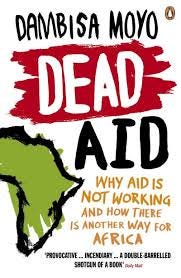Investing and FemTech startups still on my mind: check my latest findings
Focus on Uteroo, Babymigo, Susu Health,Kasha and more
Some new people here!
Thank you for joining this community and be interesting in what is lately becoming my passions: history of medicine, FemTech, investing and business.
The content of my newsletter involves a lot of research, especially the historical part. I need to read two books for the next historical character, so until I finish those and can provide an interesting and comprehensive summary of the next historical focus, I will continue feature Global South FemTech startups and anything interesting about investing in Africa.
My last newsletter sparked a lot of interest around my social media platforms (I am so happy) as also my list of newsletter and articles to read and future interviews I am planning to do both with funders and investors. When looking about the new FemTech startups in the African continent, I came across few that are really promising:
Uteroo
Uteroo is a Johannesburg-based menstrual health app that’s bringing cycles, care, and conversation into the African context. Founded by Paballo Moloi, Uteroo started as a personal project, an answer to the frustrating absence of menstruation tools that actually spoke to African women’s realities. In many communities, periods are still hidden behind euphemisms and health education is sparse.Conversations are quiet, and most apps feel like they were made for someone else.
Uteroo changes all that.
From the moment users log a cycle or record a symptom, they’re met with culturally sensitive language, local references, and a sense that this app gets them. It’s not just about period predictions, it’s about knowledge, ownership, and dignity. The app also hosts a Cycle Care Club, where users track menstrual product usage, expenses, and even reflect on wellness routines. Think of it as a gentle, data-smart space that nurtures the whole person, not just their symptoms.
Still unfunded and built without venture capital, Uteroo has slowly grown through word of mouth and grassroots adoption. Its mission remains bold: make reproductive health tools truly accessible, inclusive, and African. As FemTech expands globally, Uteroo reminds us what local innovation really looks like listening first, designing with empathy, and staying rooted in real lives.
Babymigo
In recent years, the intersection of technology and public health has opened new pathways for improving care outcomes in underserved regions. One standout example is Babymigo, a Nigerian digital health platform founded in 2017 by Adeloye Olanrewaju. Designed to support pregnant women, new mothers, and caregivers, Babymigo addresses a critical gap in maternal and infant health information across Africa. At its core, Babymigo offers a community-based support system, connecting users to verified healthcare professionals, peer networks, and localized resources. The platform, accessible via web, mobile app, SMS, and voice, enables expectant mothers to receive timely, culturally sensitive advice on pregnancy, breastfeeding, family planning, nutrition, and child development.
Babymigo’s early impact was quick. Within weeks of launching, the platform had been downloaded over 20,000 times, with hundreds of daily consultations taking place between users and health experts. Its effectiveness and scalability earned global recognition, including selection for Google’s Launchpad Accelerator Africa and a spot on TIME magazine’s “50 Genius Companies” list in 2018.
Today, Babymigo serves more than 250,000 families across Nigeria and beyond. Under the leadership of co-founder and CEO Kemi Olawoye, the platform has expanded its offerings to include expert Q&As, personalized content, product recommendations, and links to local health services. It continues to emphasize accessibility, especially for users with limited internet connectivity, through its SMS and voice platforms.
In a context where one in thirteen Nigerian women dies during pregnancy or childbirth (according to WHO estimates) Babymigo’s model represents a significant intervention. By blending digital technology with trusted community engagement, the company is playing a vital role in improving health literacy, early diagnosis, and maternal outcomes.
As it looks to the future, Babymigo is poised to deepen its impact through partnerships with hospitals, health insurers, and consumer brands, all while maintaining its commitment to empowering African families with the knowledge and tools they need to thrive.
Susu Health
Susu Health is redefining inclusive healthcare delivery in Francophone Africa through a scalable, tech-enabled model that combines care, financing, and diaspora engagement. Launched in Côte d’Ivoire in 2019, the company offers structured care bundles, ranging from chronic illness management to maternal health, on a subscription basis. Its hybrid funding approach, which allows family members abroad to co-pay for services via transparent channels, unlocks a powerful remittance-driven revenue stream. With operations spanning multiple countries and recent funding exceeding €4.5 million, Susu is well-positioned to expand across underserved African markets, capitalizing on growing demand for accessible, value-based healthcare solutions.
Susu Health represents a promising model for equitable healthcare access in West and Central Africa, addressing systemic gaps in insurance coverage and continuity of care. By offering affordable care packages tailored to conditions such as diabetes, hypertension, and prenatal needs. As governments and NGOs seek sustainable strategies for universal health coverage, Susu’s person-centered, community-integrated approach offers a replicable blueprint for inclusive health systems across the continent.
Kasha
Founded in Rwanda in 2016 by CEO Joanna Bichsel, Kasha has emerged as Africa’s foremost end-to-end e-commerce and last-mile distribution platform for women's health and household essentials. With a female-first design, the company cuts out middlemen by combining digital ordering (via website or USSD) with a grassroots agent network, pop-up shops, and wholesale capabilities serving pharmacies, clinics, and hospitals. After raising $1.5 M in seed funding and a $3.6 M Series A, Kasha secured a landmark $21 M Series B led by Knife Capital in mid-2023, bringing total funding to over $28 M.Revenue has grown 50×since its Series A, and the platform now operates in Rwanda, Kenya, and is entering South Africa and West Africa. With proven margins, B2B and B2C revenue streams, and partnerships with major suppliers, Kasha is poised for aggressive pan-African expansion and significant return potential.
Kasha delivers a vital policy intervention by improving last-mile access to essential health commodities for women and families in East Africa. By integrating digital ordering, community agents, and secure delivery channels, Kasha ensures confidential access to contraceptives, menstrual care, chronic disease medications, and more in both rural and urban communities . The platform’s evolving public-sector partnerships (such as its recent collaboration with Sanofi’s Impact Fund and the Rwanda Biomedical Centre) have enabled national-level distribution of non-communicable disease diagnostics and treatment kits, reaching over 36,000 individuals screened and enrolling more than 1,000 patients. In regions where pharmaceutical supply chains are fragmented and maternal and NCD management remain under-resourced, Kasha offers a scalable blueprint that aligns with UHC objectives and gender equity goals.
Events
I came across interesting events I believe you should participate if you want to dig more in what is happening in Africa investment and FemTech startups (you will also found me there):
Africa Start-up Funding Round-Up | 2025 mid-year edition: start-ups in Africa have indeed raised more than $1.4b in H1 2025 through $100k+ deals (excluding exits) and during this LinkedIn live session with Max Cuvellier Giacomelli (Co-founder of Africa: The Big Deal) and Maxime Bayen( Operating Partner at Catalyst Fund) moderated by Rosemond Phil-Othihiwa (Investor Accelerator Venture Fellow at Dream VC and Mentor at Google for startups Accelerator Programme Africa), will look in more detail this number, unpacking all the latest data and trends!
100 Female Founders: HealthTech Innovators Meetup at Barclays: this face to face event in London is dedicated to female founders with the aim together to solve the demand on how to get more support on setting a start up, career or academic journey and how to start your own start up and looking for mentorship, collaboration and connections opportunity. The event is organized by Barclays Innovation Hub in collaboration with Nexus, WEALTH, Hotbed, FutureFemHealth and NXGN
Also I will encourage to register for the Women’s Health Week in London October 2025 and register your interest to join the next year HLTH in Amsterdam.
My Database
I am building a database with:
Femtech start up in the western world (name, founders, website, topic, funding and more)
Femtech in Africa (name, founders, website, topic, funding and more)
Investors in Africa
Accelerator and events focused in investing in Africa
Newsletter, social media and page to follow
If you are interested to access to it please consider to become a monthly or a year paid subscriber. I will also notify when I have update the database and eventual events or topic to review.
References:
Outfit
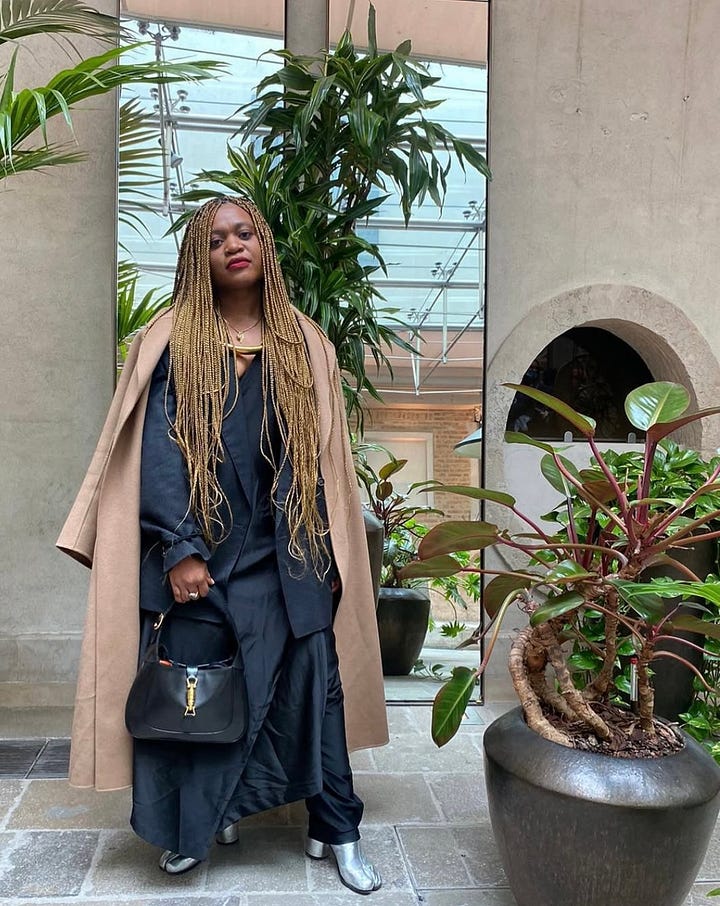
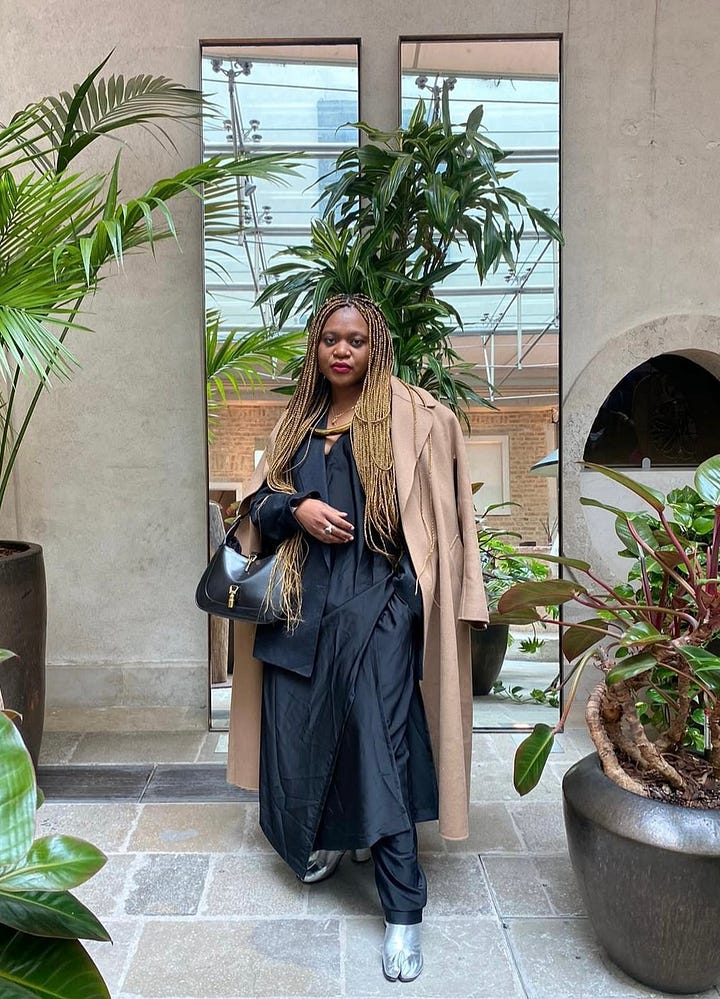
When scrolling to my pictures, I was thinking what I would wear for pitching my business or attending a business events. When I saw these pictures I took at the African Art in Venice Forum in April 2022 organised by my amazing people Mistura Allison , art curator ,and Himasha Surani music curator. In this pic I wear a set from talented Nigerian designer Sisiano, styled with my Jackie and my forever Tabi. A statement piece is also the chocker necklace from Adele Dejak.
Wishlist
I think this is more a dream wish than a Wishlist. But because a certain point I found it and was really consider it to buy it, I decided to mention it here. Obviously as always Amanda Murray just cleared the pathway and shared a story with this amazing SS20 Loewe Basque skirt. The gram went crazy and I found it in Vestiaire Collective a not a bad prize (for which a new one would have been) and after few hours somebody bought it. Fair. I will continue manifest” Everything I want, wants me (back)” 🧘
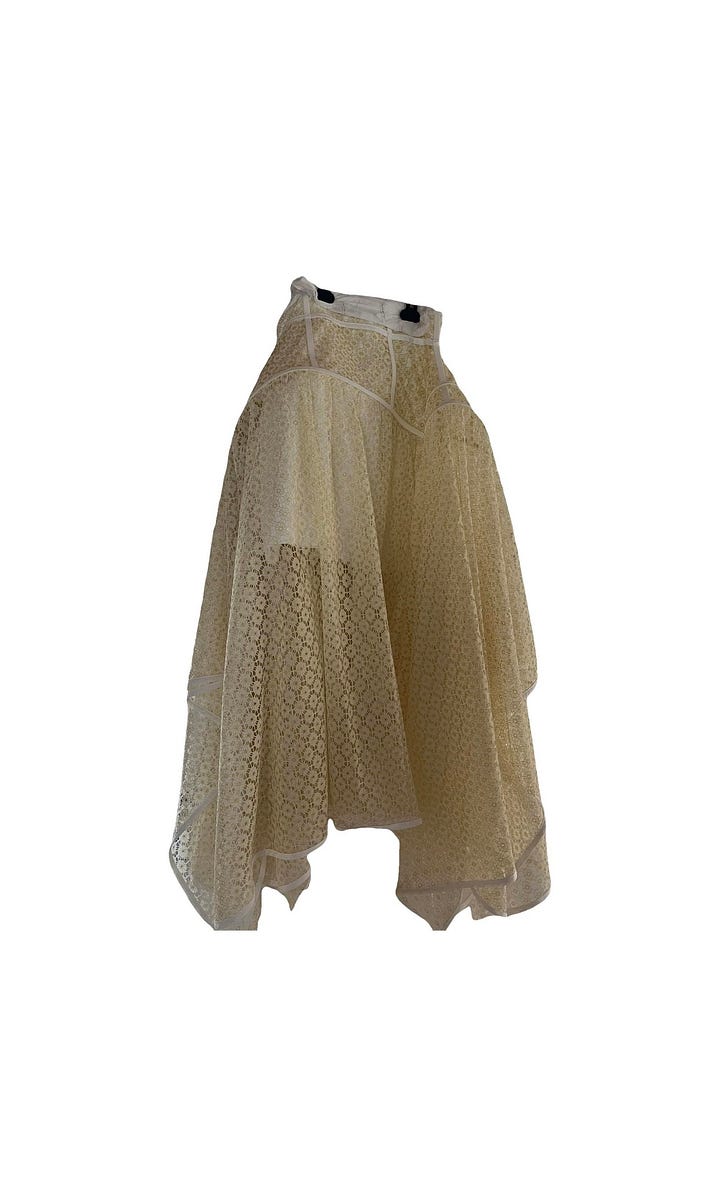
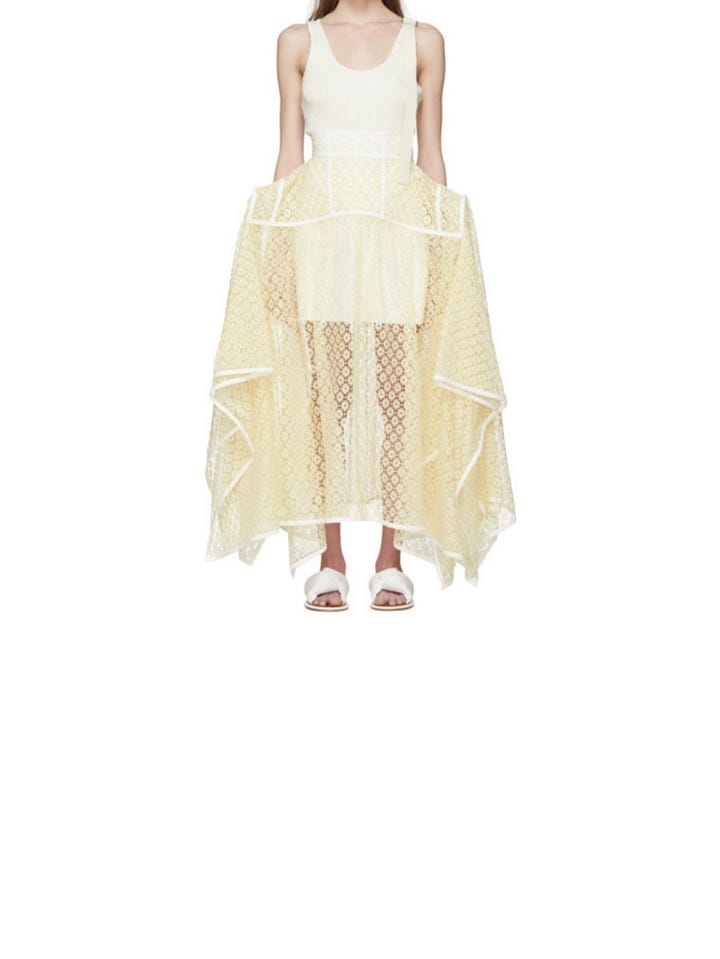
Good Reading
Together of my reading for the next historical character, before the 14th of July I need to read Dambisa Moyo book, “ Dead Aid- Why Aid is not working and how there is another way for Africa” . Why before 14th of July? Because I will attend an interesting event “International Aids Reduction and Impact on AfricanHealth System” organised by the Faculty of Public Health and I would like to be prepared for the conversation. The event is open to everyone, so please register if interested.
Music
After sending an hilarious video of Cynthia Erivo commenting “Thong Song” song and how Sisqo uses his talented voice to sing about a thong, I obviously went to listen the whole album that I used to listen on repetition (let’s forget how old I was) 😂
Anime
“Dandadan” as been on the talk in every anime geek in the last year, winning also best soundtrack (if I do not mistake) at the Crunchyroll Anime Awards. At the beginning I thought was just a weird anime but then it hit me! It is a high-energy supernatural action-comedy anime produced by Science SARU, based on Yukinobu Tatsu’s bestselling manga. The story follows high schoolers Momo Ayase, a believer in ghosts, and Ken “Okarun” Takakura, an alien enthusiast. A playful debate about ghosts versus aliens leads them to confront paranormal events: Momo encounters extraterrestrials and awakens psychic abilities; Ken is possessed by a supernatural spirit. United by circumstance, they battle ghosts, aliens, and cursed entities, such as the infamous “Turbo Granny”,while uncovering their own powers and blossoming bond. The second season is out, but I let it “stock” before totally immerse myself into it,




